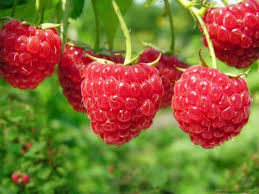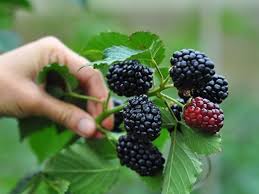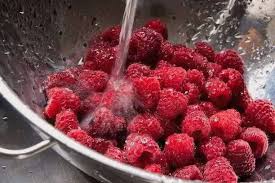Raspberries are a fruit that is very low in calories but rich in fiber, helping you feel full longer and control your appetite, thereby reducing your daily calorie intake. So do raspberries really help you lose weight? Let’s find out more in the article below!
Raspberries, a member of the rose family, are native to Europe and northern Asia and are now widely grown in temperate regions around the world. Of these, red raspberries are the most popular.
What is a raspberry?
Raspberries are small shrubs with large, flat thorny stems and long, hairy branches.

Raspberries are small, climbing shrubs.
The leaves are simple, alternate, and vary in shape from oval, ovate to nearly round, with irregularly divided lobes and palmate veins. The leaf margins are serrated, the upper surface of the leaf is dark green with coarse hairs, the lower surface is covered with soft, dull white hairs. The petioles are long, spiny, and have stipules, but the stipules often fall off early.
The inflorescences are usually borne in leaf axils or at the ends of branches, forming short clusters. The flowers are white, with bracts resembling stipules. The flowers consist of 5 hairy sepals, some of the outer leaves are split at the ends, the remaining leaves are intact. The petals are thin, round, and the stamens are numerous, as long as the petals, with flat filaments. The carpels are also numerous.
The raspberry is a compound, spherical fruit, formed from many drupes, which are red to black when ripe and can be eaten.
The flowering season is usually February – March, and the fruiting season is May – July.
Chemical composition of raspberries:
Raspberries contain ellagic acid, a tannin with great health benefits. This is a powerful antioxidant phytonutrient that helps protect cell membranes and structures in the body by neutralizing free radicals.
In addition, raspberries are rich in flavonoid compounds such as kaempferol, quercetin, and anthocyanins. Raspberries contain high levels of vitamin C (53.7%), manganese (41%), and minerals such as magnesium, copper, zinc, potassium, folic acid, omega-3, vitamin K, vitamin E, and fiber (31%).
Raspberry leaves are also rich in tannins.

Chemical composition of raspberries
Can Raspberries Really Help You Lose Weight?
Raspberries are a nutritional powerhouse, rich in vitamin C, vitamin K, and minerals like manganese and magnesium. Vitamin C not only boosts the immune system, but also protects cells from free radicals. Vitamin K plays an essential role in blood clotting and bone health, while manganese and magnesium support enzyme function and energy metabolism.
Raspberries are also a rich source of antioxidants, especially flavonoids and anthocyanins, which help protect the body from cell damage and reduce the risk of chronic diseases such as heart disease and cancer.
The fiber in raspberries plays an important role in improving digestion, preventing constipation and maintaining intestinal health. In particular, fiber helps you feel full longer, supporting the weight control process.
In addition, raspberries also have anti-inflammatory properties, helping to reduce the symptoms of arthritis and other inflammatory problems. Compounds in raspberries can help lower bad cholesterol levels and regulate blood pressure, contributing to protecting cardiovascular health. In particular, vitamin C in this fruit also promotes collagen production, giving healthy skin and reducing signs of aging.
Be careful when using raspberries
If you pick your own raspberries from wild plants, make sure to wash them thoroughly before using, as the fruit may contain toxins from insects or other elements in the wild.

Make sure to wash the raspberries thoroughly before using.
During use, if you experience any unusual symptoms, stop immediately and contact your doctor for timely advice.
Raspberries should not be used by pregnant women because of the risk of miscarriage. However, after giving birth, women can use raspberries safely.
Raspberries can interact with some medications, functional foods or herbs that you are using. To avoid risks and ensure effectiveness, you should consult your doctor or pharmacist before using any medicinal herbs.
Raspberries are rich in vitamins and minerals, especially vitamin C, which helps promote metabolism and burn calories. Antioxidants such as flavonoids and anthocyanins in raspberries also have anti-inflammatory effects, protecting the body from oxidative stress – one of the causes of weight gain.
However, for raspberries to really be effective for weight loss, you need to combine them with a healthy diet and regular exercise.





